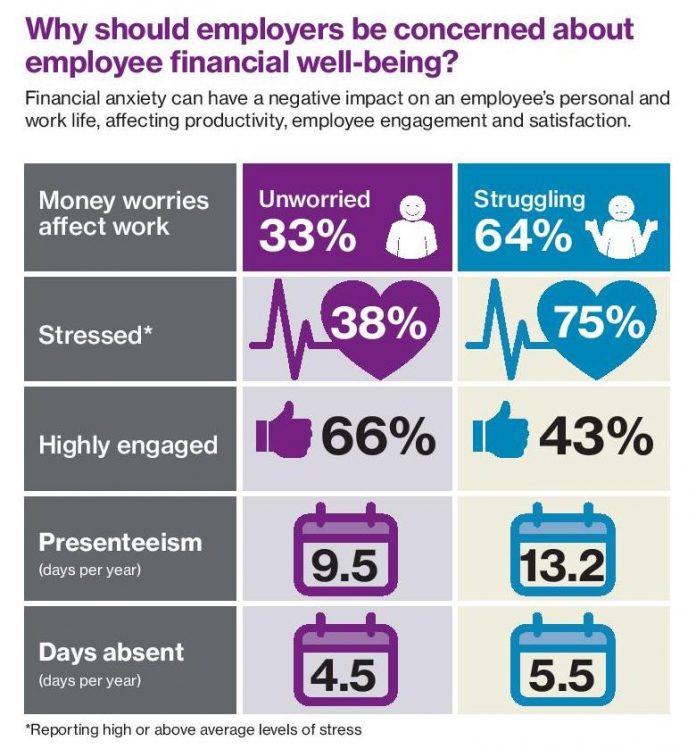The Global Benefits Attitudes Survey found that over 50 per cent of Indian employees worry about their future financial state and feel that these concerns affect their work.
More than half of the employees in India are worried about their financial state in the present and future and feel that this concern affects their performance at work, according to a latest survey by Willis Towers Watson.
The 2016 Global Benefits Attitudes Survey found that though employees’ satisfaction with their financial situation in India has increased by nine per cent since 2013, 54 per cent are still concerned about their future financial state and 52 per cent think that they are less effective at their work due to financial problems.
These financial anxieties cast doubt on their confidence in saving enough money to see them through their retirement, which is reflected in the fact that 56 per cent of Indian employees fear that they will be worse off than their parents in their retirement.
As per the report, a growing proportion of employees expect to work through their 60s to meet their financial obligations. The study that covered over 2,000 employees in India found that almost 54 per cent worry about their future financial state.
On the other hand, when questioned about their current financial state, as many as 46 per cent of employees expressed concerns and more than 1-in-3 stated that their financial problems negatively affect their lives. All these factors pertaining to financial insecurities hinder the performance of employees at the workplace.
 The survey also highlighted the fact that financial concerns have a significant impact on employee health and productivity at work. Among employees who have both short- and long-term apprehensions, 75 per cent admit to above average or high stress, while only 38 per cent of those who are not worried about either experience stress. Also, employees with both short- and long-term concerns are 1.5 times more likely to report poor health and twice as likely to opt for another job.
The survey also highlighted the fact that financial concerns have a significant impact on employee health and productivity at work. Among employees who have both short- and long-term apprehensions, 75 per cent admit to above average or high stress, while only 38 per cent of those who are not worried about either experience stress. Also, employees with both short- and long-term concerns are 1.5 times more likely to report poor health and twice as likely to opt for another job.
Talking of the financial concerns and how organisations can help combat these, Kulin Patel, director, Willis Towers Watson India says, “The growing insecurities of employees around long-term financial stability demands the immediate attention of employers. Companies are beginning to take steps by making their employees’ financial well-being a core component of their overall well-being strategy and employee value proposition. Gradually, employers are understanding the link between their employees’ well-being and their performance and productivity at work, and how this affects the organisation’s bottom line. Soon, they will realise that a holistic approach is needed to address these issues effectively.”

According to the survey, 57 per cent of Indian employees support the idea that their employer should have a role in encouraging them to save for retirement. On the contrary, 32 per cent fell they will be uncomfortable receiving targeted messages from their employer on these matters. Such complexity should be addressed with sensitivity. In addition, the report suggests that one in four employees, when asked about their top priorities, prefer superior retirement or health benefits to pay and bonus. More than two in five prefer some alternative to pay and bonus.
Patel says in this regard, “There is a need to boost engagement and productivity by reconfiguring the benefit package offered by employers. Different employee segments may require a different mix of benefits depending on their financial priorities at their given stage in life. For employers to move beyond their conventional role and intervene to support their employees, a one-size-fits-all approach cannot be adopted consistently across all organisations as a solution.”
The Global Benefits Attitudes Study (GBAS) surveyed over 30,000 non-governmental, private-sector employees in 19 countries and collated rich information on health and retirement. In India the survey was fielded across the country for the period between June and August 2015, eliciting 2,003 responses.
Value our content... contribute towards our growth. Even a small contribution a month would be of great help for us.
Since eight years, we have been serving the industry through daily news and stories. Our content is free for all and we plan to keep it that way.
Support HRKatha. Pay Here (All it takes is a minute)





































Informative survey Just cover saving options available trustworthy !!!
to reduce stress slightly